Browsegrade
On this page, you find all documents, package deals, and flashcards offered by seller Browsegrade.
- 65
- 0
- 0
Community
- Followers
- Following
65 items
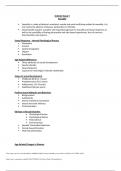
NUR 163 Notes Week 9 Sexuality
- Exam (elaborations)
- • 5 pages •
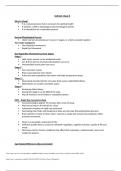
NUR 163 Notes Week 8 Sleep
NUR163, Week 8 What is Sleep? It is a natural process that is necessary for optimal health It involves a shift in physiological and neurological activity It is intended to be a restorative process Normal Physiological Process Under normal circumstances it occurs in stages, in a fairly consistent pattern Two major Categories Non-Rapid Eye movement Rapid Eye Movement Non-Rapid Eye Movement has Four Stages Stage 1 – Light sleep, person can be awakened easil...
- Exam (elaborations)
- • 4 pages •
NUR163, Week 8 What is Sleep? It is a natural process that is necessary for optimal health It involves a shift in physiological and neurological activity It is intended to be a restorative process Normal Physiological Process Under normal circumstances it occurs in stages, in a fairly consistent pattern Two major Categories Non-Rapid Eye movement Rapid Eye Movement Non-Rapid Eye Movement has Four Stages Stage 1 – Light sleep, person can be awakened easil...
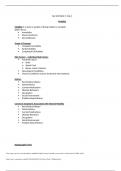
NUR 163 Notes Week 7 Mobility
Nur163 Week 7, Day 1 Mobility Mobility is a state or quality of being mobile or movable. Other Terms: Immobility Disuse Syndrome Deconditioned Scope of Concept Complete Immobility Partial Mobility Complete/Full Mobility Risk Factors – Individual Risk Factors Traumatic Injury o Brain o Spinal Cord o Bones, Joints, Muscles Neurological Conditions Chronic Conditions (and/or treatment interventions) History Past Medical Hist
- Exam (elaborations)
- • 5 pages •
Nur163 Week 7, Day 1 Mobility Mobility is a state or quality of being mobile or movable. Other Terms: Immobility Disuse Syndrome Deconditioned Scope of Concept Complete Immobility Partial Mobility Complete/Full Mobility Risk Factors – Individual Risk Factors Traumatic Injury o Brain o Spinal Cord o Bones, Joints, Muscles Neurological Conditions Chronic Conditions (and/or treatment interventions) History Past Medical Hist
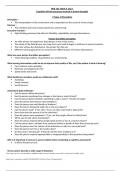
NUR 163, Week 4, Day 1 Cognition (All the processes involved in human thought) 3 Types of Perception
3 Types of Perception Perception – The interpretation of the environment and is dependent on the acuity of sensory input. Memory – The retention and recall of past experiences and learning. Executive Function – High thinking processes that allow for flexibility, adaptability, and goal directedness. Factors that af
- Exam (elaborations)
- • 3 pages •
3 Types of Perception Perception – The interpretation of the environment and is dependent on the acuity of sensory input. Memory – The retention and recall of past experiences and learning. Executive Function – High thinking processes that allow for flexibility, adaptability, and goal directedness. Factors that af
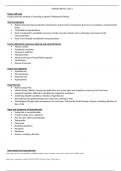
NUR 163 Notes Week 3, Day 2
NUR163 Week 3, Day 2 Morse Fall Scale A quick and easy method of assessing a patient’s likelihood of falling. Thermoregulation Balance between heat production mechanisms and heat loss mechanisms that occur to maintain a constant body temp. Controlled by hypothalamus Heat is produced by metabolic processes and by muscular activity such as shivering and conserved by vasoconstriction Heat is lost through vasodilation and perspiration Can be affected by numerous internal ...
- Exam (elaborations)
- • 3 pages •
NUR163 Week 3, Day 2 Morse Fall Scale A quick and easy method of assessing a patient’s likelihood of falling. Thermoregulation Balance between heat production mechanisms and heat loss mechanisms that occur to maintain a constant body temp. Controlled by hypothalamus Heat is produced by metabolic processes and by muscular activity such as shivering and conserved by vasoconstriction Heat is lost through vasodilation and perspiration Can be affected by numerous internal ...
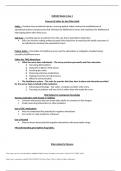
NUR 163 Notes Week 3 Day 1 Safety in Older Adults
NUR163 Week 3, Day 1 Concept of Safety for the Older Adult Safety – Freedom from accidental injuries, ensuring patient safety involves the establishment of operational systems and processes that minimize the likelihood of errors and maximizes the likelihood of intercepting them when they occur. Safe Care – Avoiding injuries to patients from the care that is intended to help them. Safe Care involves making evidence based clinical decisions to maximize the health outcomes of an indi...
- Exam (elaborations)
- • 4 pages •
NUR163 Week 3, Day 1 Concept of Safety for the Older Adult Safety – Freedom from accidental injuries, ensuring patient safety involves the establishment of operational systems and processes that minimize the likelihood of errors and maximizes the likelihood of intercepting them when they occur. Safe Care – Avoiding injuries to patients from the care that is intended to help them. Safe Care involves making evidence based clinical decisions to maximize the health outcomes of an indi...
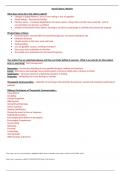
Nur163 Exam 2 Review {100%}(LATEST UPDATE)
Nur163 Exam 2 Review What does stress do to the elderly patient? Changes in Eating Patterns, such as over-eating or loss of appetite. Mood Swings – increased irritability Memory Issues – Increased forgetfulness of names, places, things that normally come naturally. Lack of concentration may become a problem. Isolation of themselves from others, refusing to socialize or participate in activities they previously enjoyed. Physical Signs of Stress Increased pulse, inc...
- Exam (elaborations)
- • 9 pages •
Nur163 Exam 2 Review What does stress do to the elderly patient? Changes in Eating Patterns, such as over-eating or loss of appetite. Mood Swings – increased irritability Memory Issues – Increased forgetfulness of names, places, things that normally come naturally. Lack of concentration may become a problem. Isolation of themselves from others, refusing to socialize or participate in activities they previously enjoyed. Physical Signs of Stress Increased pulse, inc...
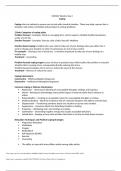
NUR 163 Notes Week 6, Day 2 Coping
UR163 Week 6, Day 2 Coping Coping refers to methods a person uses to deal with stressful situation. These may help a person face a situation, take action, be flexible and persistent in solving problems. 2 Basic Categories of coping styles Problem Focused – Examples: Work on managing time, ask for support, establish healthy boundaries, create a to-do list. Emotion Focused – Examples: Exercise, take a bath, Pep talk, Meditate Emotion based coping is helpful when you need to take care o...
- Exam (elaborations)
- • 2 pages •
UR163 Week 6, Day 2 Coping Coping refers to methods a person uses to deal with stressful situation. These may help a person face a situation, take action, be flexible and persistent in solving problems. 2 Basic Categories of coping styles Problem Focused – Examples: Work on managing time, ask for support, establish healthy boundaries, create a to-do list. Emotion Focused – Examples: Exercise, take a bath, Pep talk, Meditate Emotion based coping is helpful when you need to take care o...
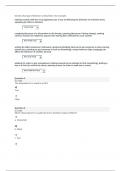
Ball State University SPCE 689 RRVerbalBxFinal Study.
Decide what type of behavior is described in the example: making sounds with the vocal apparatus (as a way of affecting the behavior of someone else) speaking (to affect a listener) coughing (because of a discomfort in the throat), yawning (because of being sleepy), making various sounds not related to anyone else having been affected by such sounds writing (to affect someone's behavior), gesturing (holding hand up to get someone to stop moving toward you, pointing to get someone to look ...
- Exam (elaborations)
- • 20 pages •
Decide what type of behavior is described in the example: making sounds with the vocal apparatus (as a way of affecting the behavior of someone else) speaking (to affect a listener) coughing (because of a discomfort in the throat), yawning (because of being sleepy), making various sounds not related to anyone else having been affected by such sounds writing (to affect someone's behavior), gesturing (holding hand up to get someone to stop moving toward you, pointing to get someone to look ...
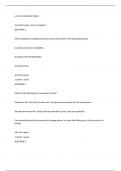
Final Exam SPCE 609 {100%}(LATEST UPDATE)
QUESTION 1 Self-management strategies have been used with which of the following students: students with severe disabilities students with mild disabilities students at-risk all of the above 1 points Sa
- Exam (elaborations)
- • 10 pages •
QUESTION 1 Self-management strategies have been used with which of the following students: students with severe disabilities students with mild disabilities students at-risk all of the above 1 points Sa
